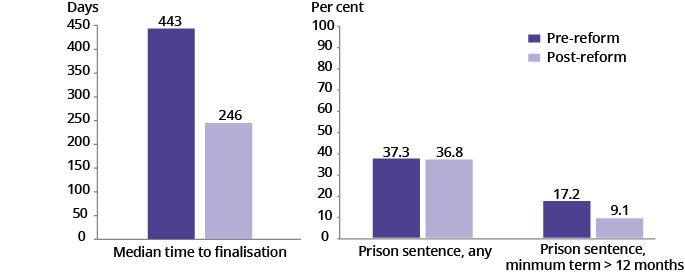Summary
Background
The Table Offences Reform involved reclassifying some strictly indictable offences that must be dealt with in the higher courts, to ‘Table offences’ that can be dealt with in the Local Court.
We examine the impact of the second tranche of the Reform on District and Local Court finalisations, court delays and sentencing. The second tranche included subsets of justice procedure and proceeds of crime offences (introduced in April 2018), and robbery and supply of prohibited drug offences (introduced in July 2018).
Outcomes are compared for charges of interest in the 18 months before and after the introduction of the reform.
Key findings
- There were 1,800 matters relating to charges in the 18 months after the introduction of the reform.
- 79 per cent of matters post-reform were finalised in the Local Court, resulting in 81 fewer trials and 1,020 fewer sentenced finalisations in the District Court compared with the pre-reform period.
- The median time from charge to finalisation decreased from a median of 443 days for pre-reform charges to 246 days for post-reform charges.
- Of those guilty of reform-related charges, 37 per cent received a penalty of imprisonment, both pre- and post-reform. However, fewer offenders post-reform received penalties of imprisonment of longer than 12 months (9% with non-parole period more than 12 months post-reform versus 17% pre-reform).
- Over 80 per cent of matters impacted by the reform involved the supply of prohibited drugs.
- Significant differences in prison penalties of more than 12 months post-versus pre-reform were found for drug supply charges after adjusting for a range of factors such as prior offending, number of offences and plea.
Conclusion
Findings from this study provide further evidence that reclassifying offences from strictly indictable to Table offences reduced the number of matters finalised in the District Court and court delay, and decreased the likelihood of longer prison penalties being imposed.
